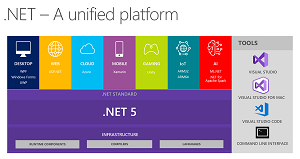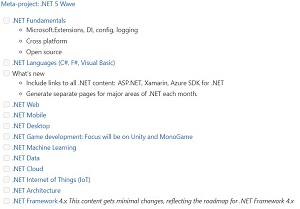News
As .NET 5 Nears, Content/Documentation Reorganization Starts
A GitHub project is seeking to reorganize documentation and developer content in advance of the November debut of .NET 5, a unification of all things .NET that combines. .NET Core and other components.
"There will be just one .NET going forward, and you will be able to use it to target Windows, Linux, macOS, iOS, Android, tvOS, watchOS and WebAssembly and more," Microsoft said last year in announcing .NET 5, which will include desktop components, web, cloud, mobile, gaming, IoT and AI.
Along with that huge consolidation effort, a GitHub issue titled ".NET 5 Wave - Reorganization #18923" is seeking to change the way users and developers find content, such as documentation.
"For .NET 5, we are reorganizing the content to match the workloads describing what you can build with .NET. Each child project contains the issues (tasks) for that specific workload area," says the issue opened by Microsoft's David Pine. "The amount of work reflects the organization of content that no longer reflects the modern .NET vision. Visitors should not need to understand the history of .NET to find information to build .NET apps now.
"However, existing customers should be able to easily find content based on their current knowledge of the product and its brand names."
 [Click on image for larger view.] .NET 5 (source: Microsoft).
[Click on image for larger view.] .NET 5 (source: Microsoft).
Areas being targeted include ".NET Framework (.NET 5 Wave)," the legacy offering before .NET Core took .NET cross-platform and open source. It will require little new content, mainly involving moving existing content.
By contrast, ".NET Fundamentals (.NET 5 wave)" will require the most reorganization. "The docs we have now are organized around 'Framework', 'Core', and '.NET Standard'. Navigation requires understanding the history. That's a barrier for new .NET developers. The new organization reflects the 'One .NET' vision of .NET 5 / .NET 6," that item states.
Other areas of reorganization run the gamut from web to mobile to data to cloud to machine learning.
 [Click on image for larger view.] The .NET 5 Wave Project (source: Microsoft).
[Click on image for larger view.] The .NET 5 Wave Project (source: Microsoft).
One reader in a comment asked if the .NET Web and .NET Mobile areas will see existing ASP.NET and Xamarin documentation get merged in.
"Yes and no, and on different schedules," was the reply from Bill Wagner. "I'll defer to the respective issues and projects for a detailed discussion. Here's a brief version:
"In both cases, these docsets will appear under the docs.microsoft.com/dotnet docset. The ASP.NET Core docs will be published under docs.microsoft.com/dotnet/web. Some xamarin docs will be published under docs.microsoft.com/dotnet/mobile.
"However, we're not moving the source or closing those repositories. Instead, we'll update build scripts to chagne the active URL. We will keep history and the repository organization."
About the Author
David Ramel is an editor and writer at Converge 360.